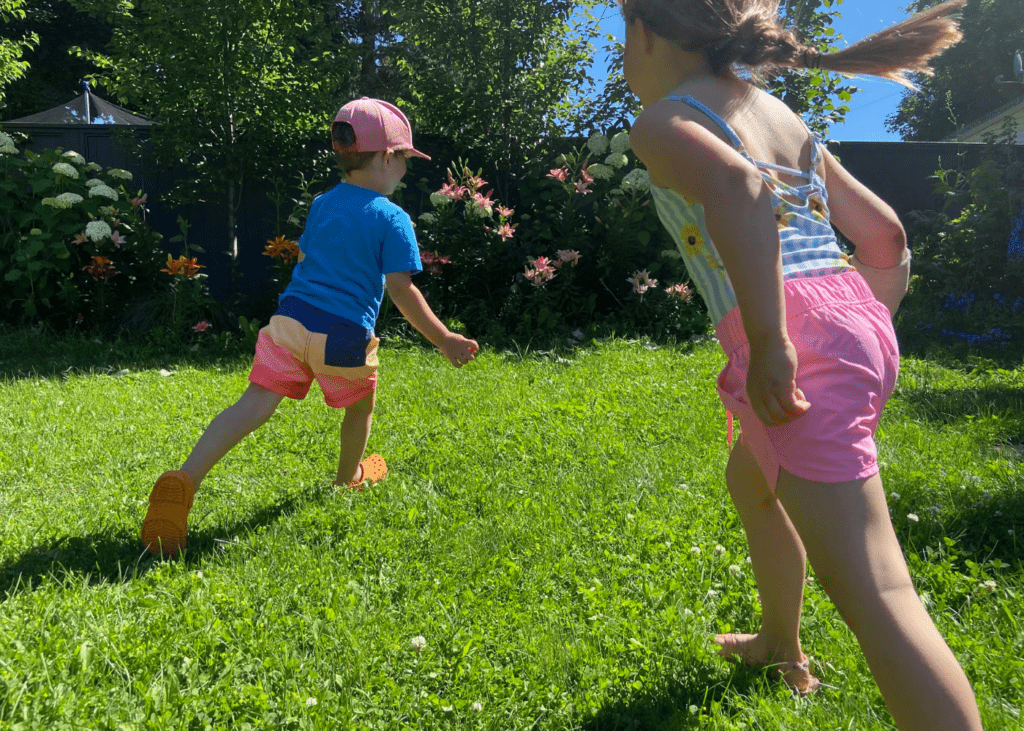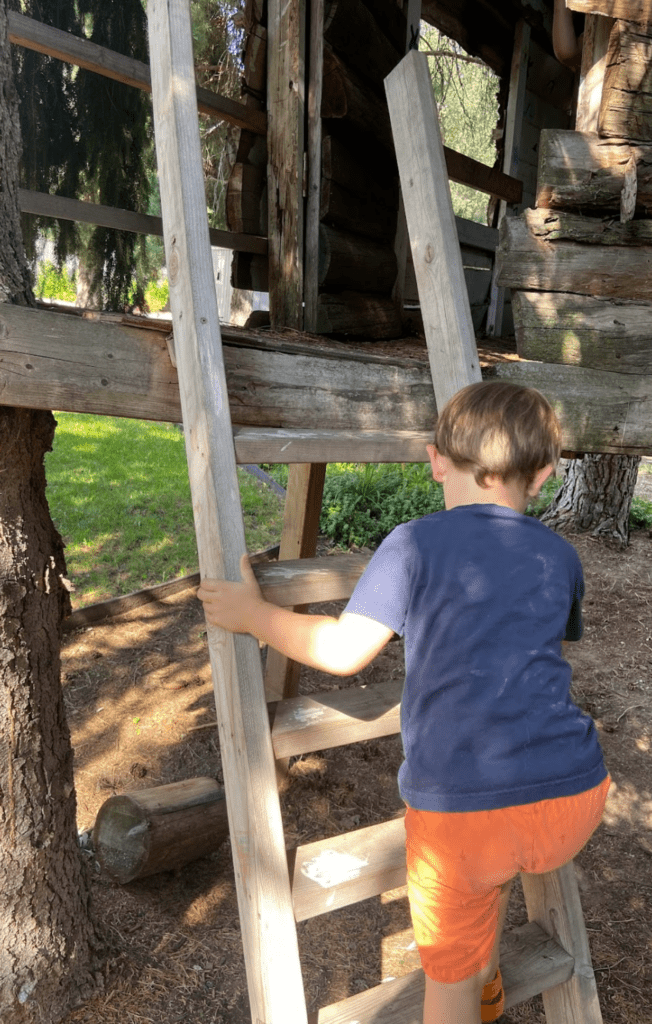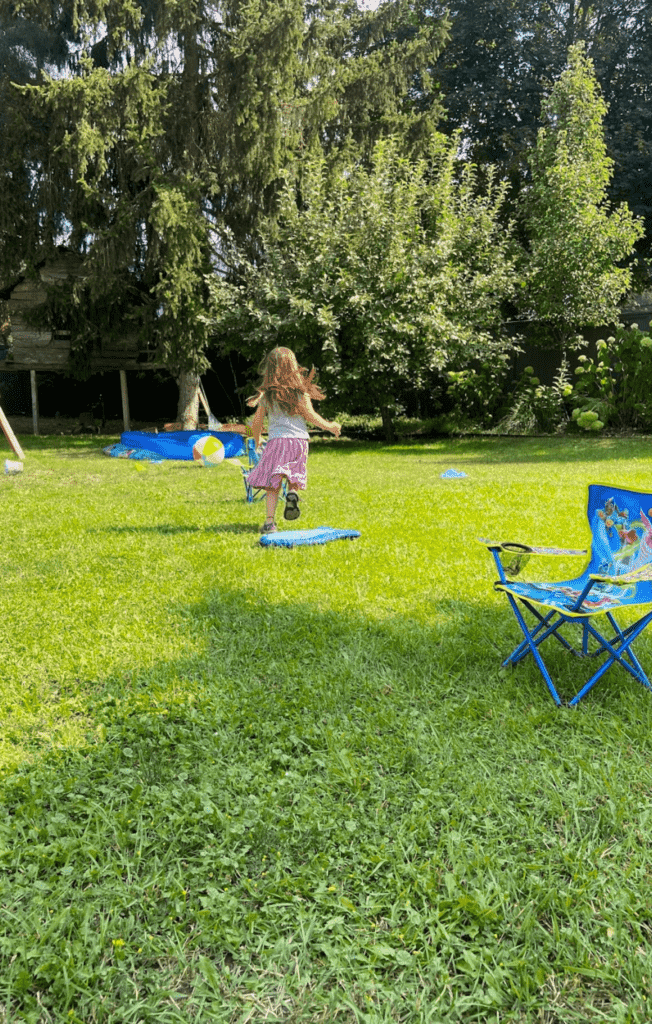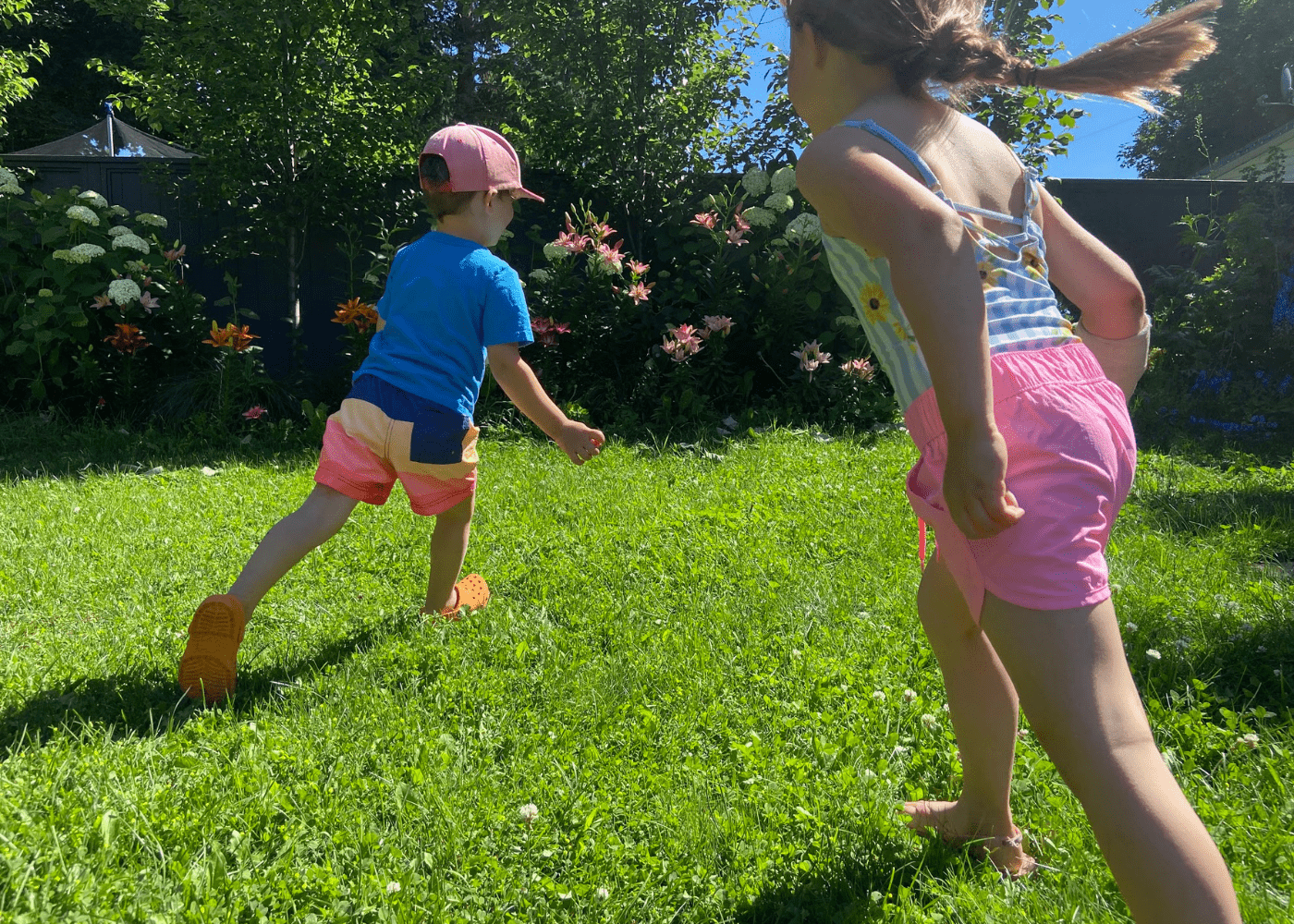Nature provides one of the best classrooms for children. From physical literacy to art, the options for learning outdoors are limitless. Today we are focussing on some great ways to teach physical education to kids over the summer break, no matter their age!
This article will discuss the following:
- What is Physical Literacy?
- Why is Outdoor Play Important?
- Ideas for Different Ages

What is Physical Literacy?
Physical Literacy can be defined as…
The motivation, confidence, physical competence, knowledge, and understanding to value and take responsibility for engagement in physical activities for life
The International Physical Literacy Association, May 2014
That definition may sound intimidating, but it’s actually super easy to support learning through physical activity at home. Exposing your children to physical literacy at a young age equips them with the essential skills and knowledge needed to live a healthy lifestyle.
Even better, there are lots of simple ways to increase your child’s confidence in this area through play!
Why teach physical literacy through outdoor activities?
Ultimately, outdoor play will not only instill an appreciation for pursuing an active lifestyle, but it will increase your child’s confidence and physical capability as well.
This will allow them to participate in a broad range of activities during their young years and empower them to take on opportunities that would otherwise have intimidated them.
*For many more great resources and information about the topic, head over to Physical Literacy’s website!
So, how else are the outdoors and physical literacy connected? Well, let’s find out!

Is outdoor play important?
The great outdoors offers the perfect environment to run, jump, and play. Unlike inside, where one has to worry about bumping into walls or breaking furniture, children are free to explore when their activities are taken outdoors.
Here are some of the benefits to learning outside.
1. Children can learn a variety of skills outdoors. They can practice everything from math to science and art (& every subject in between)!
This invites young ones to be hands-on in their own learning. Giving them a memorable experience while teaching them about the world around them also allows for a deeper understanding than what is usually offered in a traditional classroom.
Don’t get me wrong, classroom learning is excellent – But why not let them connect what they learn in school to understand the way our physical world works?!
2. For busy parents, outdoor play is an excellent way to let children explore and discover on their own – With little to no planning
For example, one of my favorite outdoor games is “Animal Crawl”
Simply have the children line up, choose an animal to mimic, and race to the finish line while copying the chosen animals’ movements!
Incorporate a variety of animals for increased physical literacy, such as: Jumping like a bunny, slithering like a snake, stomping like a dinosaur, and crawling like a tortoise. They won’t even realize they are learning because they will be too busy racing and laughing!
3. Increase social skills and interaction with other children
There is likely a park close to where you live – By taking some time each week to play in this space, your little ones will have the chance to meet lots of other children.
In doing this, they can practice their social and emotional skills all while learning important foundational skills like taking turns, sharing, and taking safe risks in a controlled environment
The opportunity to run faster than indoors, climb structures, jump as high as they can, or learn new things like biking or swimming is exciting and empowering.
Though there is an increased risk of injury, like scraped knees, your children can safely push the boundaries and explore new things while increasing self-confidence in their physical capabilities.
While playing games with other children, young ones also learn how to follow directions and listen to the rules of the games.
Introducing this at a young age will make a world of difference once they enter school and must listen to not only their teachers but those monitoring during recess and their teammates while playing sports.
4. Create a strong connection with the natural world
Reading books and watching videos about your local flora and fauna are great, but why not try to observe these things in their natural environment, too?
Between activities outdoors, try engaging your children in conversation about what they see – This allows them to observe, predict, and learn about what they are seeing in a more tangible way!
Really, the outdoor play feels like a brain break for your little ones but is really just a different type of learning!
5. Reduce restlessness and boredom
Summer break can be tough.
Often, parents’ schedules are just as busy as the rest of the year even though their children’s activities are paused. Giving your kids some time to play outside lets them get energy out in a positive way while increasing their physical literacy and reducing restlessness.
After a day of exploring, and expending lots of energy, your little ones are also more likely to get a good night’s sleep!
*While this list is long, it’s not all-inclusive! There are many more reasons to take your children outdoors, but these are some of the most stand-out to me.
Though it can definitely be difficult to fit this time into your already packed schedule, you will be creating memories with your children that they will never forget. In my opinion, that makes it worth the associated hassle!

Outdoor play ideas for all ages
Regardless of how old your children are, there is always a way to take their learning outdoors!
Outdoor play can be as simple as getting out in the fresh air, heading to the local park to play ball games or swing on the monkey bars, or holding relay races and hula hooping contests with friends.
Some kiddos may have a favorite outdoor activity of their own, like horseback riding, or they may simply enjoy the chance to draw with sidewalk chalk or climb trees.
Either way, outside activities don’t need to be complicated, and you don’t need a lot of equipment to get kids moving while having fun outdoors. Regardless of what you’re doing, the most important is that you encourage children to have fun while working on their fitness.
Here are some more very easy games and activities for your little adventurers.
Babies
Though babies aren’t highly mobile yet, they are still curious about their surroundings. Outdoor play at this age is super simple, but still just as beneficial as it allows them to gain exposure to nature!
Here are some things you can try:
- Outdoor tummy time on a towel/blanket
- If your baby is mobile, follow this link to check out Amazon’s Summer Infant Pop ‘N Play Deluxe Ultimate Playard! Not only does it allow your young ones to safely move around in their space, but it protects them from the sun’s strong rays, too.
- Allow your baby to crawl through grass or sit amongst flowers! Giving them the chance to feel different textures is great for sensory development
- Take them on a walk through your outdoor space. By carrying them up close to trees, flowers, etc, they can touch, smell, and look at nature up-close
Toddlers
Toddlers are experiencing so much physical growth – and this is the perfect opportunity to enhance those skills while instilling a love of the outdoors in them!
To help develop their physical literacy, here are some fun options:
- Practice throwing, catching, and kicking with sports balls. You can even set up ring toss or challenge them to throw objects into buckets. You don’t need to play a specific sport, but this kind of play helps the child learn foundational skills for later sports activities
- Balance can easily be practiced by setting up an obstacle course of found objects, like sticks, stones, etc
- Bubbles! Which kid doesn’t love those?! Though you may want to hold the container so that it isn’t dumped right away, let your toddler blow the bubbles or try to pop them as they float through the air
- Running, jumping, rolling, and climbing are better done outside, anyway! Let them explore the natural world while developing these crucial skills
- Introduce different textures, like sand, water, mud, and grass. Be sure to always, always monitor water play closely, though, for your child’s safety
- Create a nature collage! This is a great seasonal activity. You can create one for all of the seasons to show off the seasonal changes in your yard
Preschoolers
Children at this age are more capable of structured games with simple rules. This is also a great time to focus on developing skills that will help them cooperate with others!
Some ideas include:
- Imaginative play. Perhaps your young one is really into cooking – encourage them to create mudpies or dirt soup! They will surely get a laugh out of you pretending to eat their creations, too
- Mimic what you see outdoors with some easy stretches together. You can start by sitting on the ground and pretending you are a small seed. Next, stretch into a tall flower and move side to side like you’re waving in the wind. Then, return back to sitting as you “shed” your petals like a plant does after it blooms
- Nature walks together are a great chance to play easy games such as I Spy with my Little Eye! Naming all of the sounds you hear is good, too. Try engaging all 5 senses by asking what they smell and feel – and even taste if you’re lucky enough to find foraged treats! *Just be sure you are positive about what they’re eating, as not all wild berries and fruits are edible
- Easy games like Simon Says, Hide and Seek, or pass with a ball are all great for developing comprehension and physical literacy at the same time
- Scavenger hunt. Maybe they need to find different shapes in nature, different types of bugs, or types of trees? You could also time the activity to turn it into a race, making it even more active!

School-aged children
At this age, a blend of free play and structured activities is crucial for outdoor learning. Since they will spend long days in structured classroom settings, it is important to create space for imaginative play too.
Perhaps they could:
- Create their own game! Help them make a list of rules and see what they can come up with
- Tag, and its endless variations, are so simple and easy that it doesn’t feel like a structured game. Best of both worlds!
- If you have enough space, challenge them to create an outdoor “Playhouse”!
- Allow them to do new and challenging things
You may also enjoy…
If you’re looking for more articles on outdoor education with kiddos, I’d suggest reading these two articles as well:


Leave a Reply